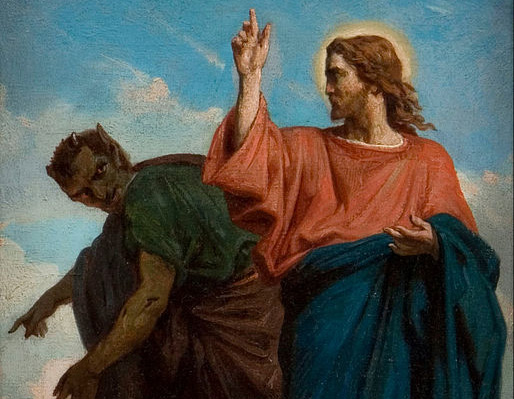I am adding updates at the end.
I would hope that by now, readers are quite aware of the massive, nationwide popular protests and other actions by the people of Iran against the ruling Shia Muslim regime, headed by Ayatollah Khamenei. It began about 14 days ago, impelled at the start by the massive devaluation of Iran's currency, the rial, plunging the nation into severe inflation.

But that devaluation was merely the "presenting issue" for the protests, leading now to millions of Iranian citizens taking to the streets across the entire nation to denounce the regime and in some places, burn government buildings. But presenting issues are never the issue, they are just the straw that breaks the camel's back. The fundamental issues relate to the decades of harsh, violent oppression of the Iranian people by the hardcore Islamist regime. Recall that just last month, there was the Kish Island marathon race where hundreds (maybe more) of women refused to wear head covering, defying strict Islamic dress codes that have seen increased public defiance since at least 2022.
Just a few days ago, the regime blocked internet across the country. Elon Musk has made Starlink available to them, and almost all reports from the anti-regime movement are sent that way.
So what is the fundamental issue?The popular rebellion springs from two basic conditions that have been building and reinforcing resentment against the ayatollah-led national government for many years. First is that in religious demographics, there has been a massive shift away from Islam in general, Shia Islam specifically.
while we we commonly think of Iran as a Shia Muslim nation, independent studies, not under control of the regime, belie it. From, "Iran’s secular shift: new survey reveals huge changes in religious beliefs," published in 2020:
Our results reveal dramatic changes in Iranian religiosity, with an increase in secularisation and a diversity of faiths and beliefs. Compared with Iran’s 99.5% census figure, we found that only 40% identified as Muslim.
In contrast with state propaganda that portrays Iran as a Shia nation, only 32% explicitly identified as such, while 5% said they were Sunni Muslim and 3% Sufi Muslim. Another 9% said they were atheists, along with 7% who prefer the label of spirituality. Among the other selected religions, 8% said they were Zoroastrians – which we interpret as a reflection of Persian nationalism and a desire for an alternative to Islam, rather than strict adherence to the Zoroastrian faith – while 1.5% said they were Christian.
What accelerating changes have come in the last five years cannot be determined confidently, but the 2020 World Values Survey showed that Shia Islam adherents were down by 32% from the prior survey. As it also points out,
Official figures often inflate Muslim numbers due to laws penalizing apostasy, leading to undercounts of atheists, agnostics, and other faiths, with significant numbers of Iranians identifying as non-Muslim or secular in independent studies. ... Conversion from Islam is illegal and apostasy can carry the death penalty, distorting official data. Independent surveys reveal a growing secular or non-Muslim segment within Iran, challenging state narratives.
So it is no surprise that the passing years have brought rapidly increasing discontent with the nation being ruled according to very strict, unforgiving dictates of Muslim sharia law, and increasingly lethal dictates at that.
The pre-protest status quo was very harsh. According to a US Dept. of State report released by the Biden administration in 2022:
According to numerous international human rights NGOs and media reporting, the government convicted and executed dissidents, political reformers, and peaceful protesters on charges of “enmity against God” and spreading anti-Islamic propaganda. Authorities carried out hudud punishments such as amputation of fingers (for theft), flogging, and internal exile. The government denied individuals access to attorneys and obtained false confessions through torture in some cases. It reportedly detained and held members of religious minorities incommunicado. In his July report on human rights in Iran, the UN special rapporteur on the situation of human rights in the Islamic Republic of Iran (UNSR) expressed alarm at “the disproportionate number of executions of members of minority communities, in particular the Baluch and Kurdish minorities,” who together accounted for 35 percent of the 251 individuals executed between January and June. The Abdorrahman Boroumand Center for Human Rights in Iran (ABC) reported there were 576 executions in 2022, including 71 in December, an increase from 317 executions in 2021 and 248 in 2020. On November 16, Amnesty International reported that authorities were seeking the death penalty for at least 21 persons, many for “enmity against God.” The Human Rights Activists News Agency (HRANA) stated that during the year, the government arrested 140 individuals, imprisoned 39, issued travel bans against 51, summoned 102, raided the homes of 94, and brought 11 to trial for their religious beliefs. Government officials, including the Supreme Leader, routinely engaged in egregious antisemitic rhetoric and Holocaust denial and distortion.
The report goes on to document repeated, violent human rights oppression by the Iranian government against vast swaths of citizens, particularly related to religion and enforcement of sharia law.
Today's protest/rebellion
With the sudden devaluation of the rial, the "enough is enough" was reached. Over the last two weeks, street protests began and spread, slowly at first and then rapidly and widely, now taking place in every province in the country. Calls for the end of the regime began and spread, along with demands that governing the country be returned to Iran's historic monarchy, headed now by Shah Reza Pahlavi, who, according to The Times of Israel, is ready to return.
The US-based son of Iran’s ousted shah says he is prepared to return to the country and lead a transition to a democratic government.
“I’m prepared to return to Iran at the first possible opportunity. I’m already planning on that,” Reza Pahlavi says on the Fox News show “Sunday Morning Futures” with Maria Bartiromo.He adds: “My job is to lead this transition to make sure that no stone is left unturned, that in full transparency, people have an opportunity to elect their leaders freely and to decide their own future.”
But that may not be a great idea. As the NY Post reports,
Pahlavi may be the figurehead of the monarchists, but he does not represent the majority of the 92,000,000 people of Iran or the millions of Iranians in the diaspora. President Trump has been right to state that it would be inappropriate for him to meet with him as president, as Pahlavi has proven to be a divisive rather than unifying figure. ...
What appeal Pahlavi may have is not due to any personal accomplishments — he has not created any successful businesses or built any institutions. Also, he does not have a revolutionary infrastructure inside or outside of Iran. He does not even appear to have a fully paid office staff.
His prominence stems from a sense of nostalgia for pre-revolutionary Iran, constant promotion by Persian-language media such as Iran International and reported cyber operations and diplomatic support by elements of the Israeli government.
Today's status quo
Multiple news outlets have reported that, as predicted when the regime shut down internet access across the country three days ago, the regime has resorted to violence to crush the demonstrations. The BBC reports that as of now, many hundreds, perhaps thousands, of Iranian protesters have been killed by Iranian police, Revolutionary Guard, and army forces. The UK Guardian also reported, "The streets are full of blood" and,
Video emerged of riot police breaking into a hospital treating wounded protesters in the western province of Ilam on 4 January, shocking Iranians, who were outraged at the beating of patients and doctors.
The BBC reports that 10,600 people have been arrested and imprisoned so far, a figure that is surely below the real number. Hospitals are reported to be overwhelmed by the number of shot Iranians brought there.
 |
Bodies outside a medical
centre in Tehran, from Reuters. |
The Guardian report said,
A demonstrator who gathered in the Tajrish Arg neighbourhood detailed how snipers were firing at crowds, saying that he saw “hundreds of bodies” in the streets.
A picture of two Irans began to emerge.
During the day, state TV and official government bodies projected an air of normalcy, airing pro-government demonstrations and footage of people going about their business in neighbourhoods that were free of any protest actions.
At night, videos of protests raging through the streets leaked to the rest of the world, brought out at great effort by activists and shared with the Iranian diaspora abroad. Videos showed protesters braving the crackdown, with thousands marching through the streets across the country despite facing what appeared to be live fire from authorities.
What will the next day or two bring?
Ayatollah Khamenei has proclaimed the protesters as "enemies of Allah," which carries an automatic death sentence. Multiple Iranians have reported that the regime's forces have been firing indiscriminately into the crowds.
That level of deadly force may quell the rebellion. OTOH, it may make the public conclude that it's now or never to overthrow the regime, concluding quite reasonably that to try again later will bring mercilessly forceful responses much more quickly than this time.
Will the United States strike Iran?
CBS News reports,
President Trump was briefed on new options for military strikes in Iran, a senior U.S. official confirmed Sunday.
Mr. Trump appeared to lay out his red line for action on Friday when he warned that if the Iranian government began "killing people like they have in the past, we would get involved."
"We'll be hitting them very hard where it hurts," he said at the White House. "And that doesn't mean boots on the ground, but it means hitting them very, very hard where it hurts." ...
The New York Times and The Wall Street Journal, citing anonymous U.S. officials, first reported Saturday night that Mr. Trump had been given military options but hadn't made a final decision. The WSJ reports that Trump will receive further options on Tuesday.
The U.S. has not moved any forces in preparation for potential military strikes. ...
Mohammad Bagher Qalibaf, Iran's parliament speaker and a hardliner who has run for the presidency in the past, warned Sunday that the U.S. military and Israel would be "legitimate targets" if the U.S. strikes the Islamic Republic.
"In the event of an attack on Iran, both the occupied territory and all American military centers, bases and ships in the region will be our legitimate targets," Qalibaf said, according to the Associated Press. "We do not consider ourselves limited to reacting after the action and will act based on any objective signs of a threat."
Would US military intervention be justified? I says yes. But that does not mean it would be wise. And I would say as well that, unlike the limited strike against select Venezuelan targets to support the capture of its president, Nicolás Maduro, military action against Iran would require prior Congressional authorization.
But it should also be realized that Congress need not "declare war" against Iran. It need only recognize that the United States has been at war with Iran almost since the beginning of the post-Shah regime in 1979. While we have not declared war with Iran, it has definitely made war against us. And to ensure the success of replacing the regime there now may be worth the risks of direct US operations. After all, since 1979, Iran and its proxy groups have killed more than 1,000 Americans, including U.S. service members, diplomats, and civilians in various attacks worldwide, many of which occurred in the Middle East. See here for the list, which is not short.
There is another major factor, however, that mitigates against direct US military action. It is that the central key to whether the regime stays in power is the loyalty of the Islamic Republic Guard Corps, IRGC. The IGRC has two major functions: internal security through its Gestapo-equivalent arm, the Basij, and overall control of Iran's military and foreign policy, especially subverting western nations. On that function, "On 22 November 2020, Hussein Salami, the IRGC Commander-in-Chief, acknowledged: 'Today, the power of the Islamic Revolution has removed America from its strategic base. Today, the Basij discourse has spread in Yemen, Lebanon, Syria, Iraq, Latin America, and parts of Africa' " (link).
However, as retired Army officer and strategy analyst Robert Maginness observes,
This creates a decisive tension. On one hand, the IRGC has every reason to defend the regime that enriched it. On the other, prolonged instability, sanctions, and economic collapse threaten the very assets the Guards control. At some point, self-preservation may begin to compete with ideological loyalty.
That is why Iran’s future may depend less on what protesters do in the streets—and more on whom the IRGC ultimately chooses to back.
I think that there is surely awareness within the Trump administration that while Iran's regime must fall, it must fall at the hands of Iran's people, not the United States. Otherwise, the new government, whether run by the Shah or a democratic vanguard of the people, will not be seen by other nations as legitimate, and probably not by a significant number of Iranians - remember, the vast majority of Iranians are not joining the rebellion.
I anticipate that US action will be mostly covert and directed toward two main objectives. First, advisory, material, and financial support to the revolutionists, especially in organization and establishing internal command and control. We will also enable communications that do not use the internet. I do not rule out that we will supply them weapons.
Second, actions to decrease the IRGC's effectiveness in the near term, such as jamming communications and inserting counterfeit messaging into their comms systems. Axios reported late Jan. 11 that,
U.S. officials said most of the options that will be presented to the president at this stage are "not kinetic."
Such options include steps to deter the regime, like announcing an aircraft carrier strike group is heading to the region.
The officials said cyberattacks and information operations against the Iranian regime are also being considered.
The focus will be on increasing the capabilities of the revolutionists and decreasing the ability and the willingness of the IRGC to support the regime. There is no guarantee of success, of course. And it will almost certainly prove much more difficult than anticipated.
Let us hope, however, that the people of Iran may persevere and replace the regime there on their own accord, and with as little loss of life as possible. For if they do not succeed, countless more will be killed by the regime nonetheless. That is their new reality, and I have to believe that they know it.
Update, Jan. 12:
The revolutionists may well be doubling down. Link to video: https://x.com/Tendar/status/2010465996042064329
Hudson.org, Jan. 9: "The Ayatollah’s Regime Is Crumbling."
Update, Jan. 13:
1. The value of the rial has now dropped like an anvil tossed from a hot air balloon.
Iran’s currency collapse is the final non-kinetic phase transition before irreversible regime fragmentation. This is an extinction-level internal systems failure. ...
Regime Forecast:
No currency = no supply chain = no governance = no control
The currency didn’t just collapse
The state did
2.
How does an authoritarian regime die? As Ernest Hemingway famously said about going broke – gradually then suddenly.
The protesters in Iran and their supporters abroad were hoping that the Islamic regime in Tehran was at the suddenly stage. The signs are, if it is dying, it is still at gradual.
The last two weeks of unrest add up to a big crisis for the regime. Iranian anger and frustration have exploded into the streets before, but the latest explosion comes on top of all the military blows inflicted on Iran in the last two years by the US and Israel.
But more significant for hard-pressed Iranians struggling to feed their families has been the impact of sanctions.
In the latest blow for the Iranian economy, all the UN sanctions lifted under the now dead 2015 nuclear deal were reimposed by the UK, Germany and France in September. In 2025 food price inflation was more than 70%. The currency, the rial, reached a record low in December.
While the Iranian regime is under huge pressure, the evidence is that it's not about to die.
Crucially, the security forces remain loyal.
More at the link, of course.




















